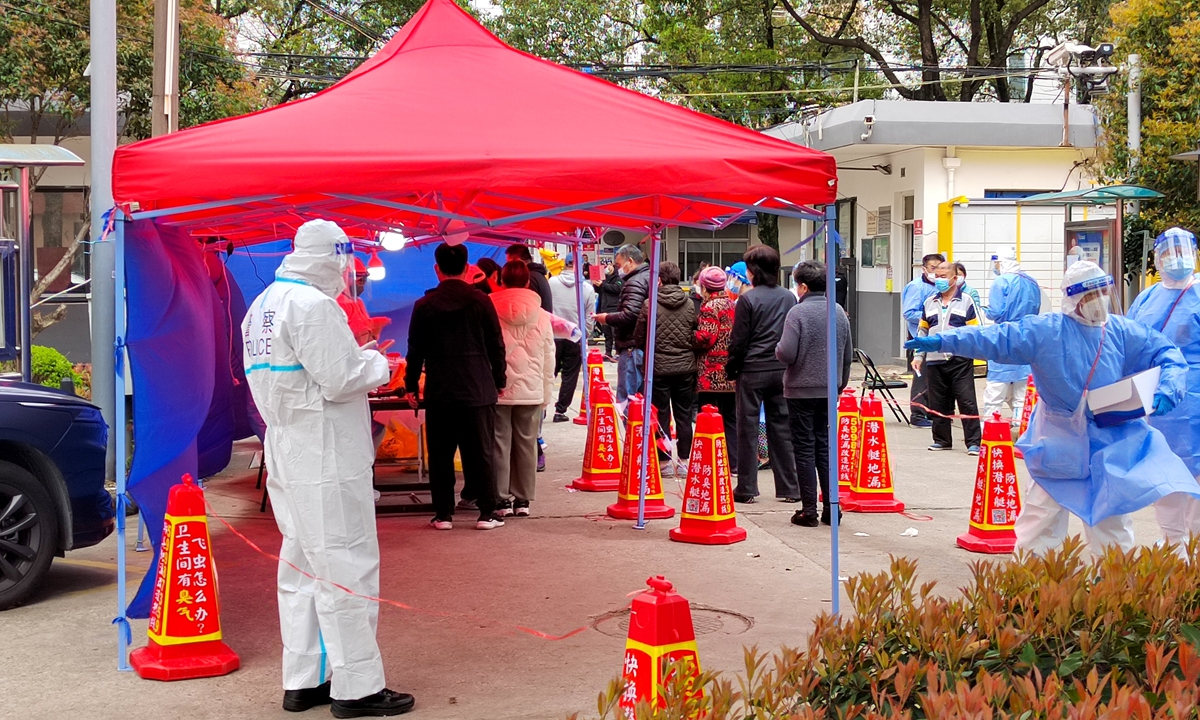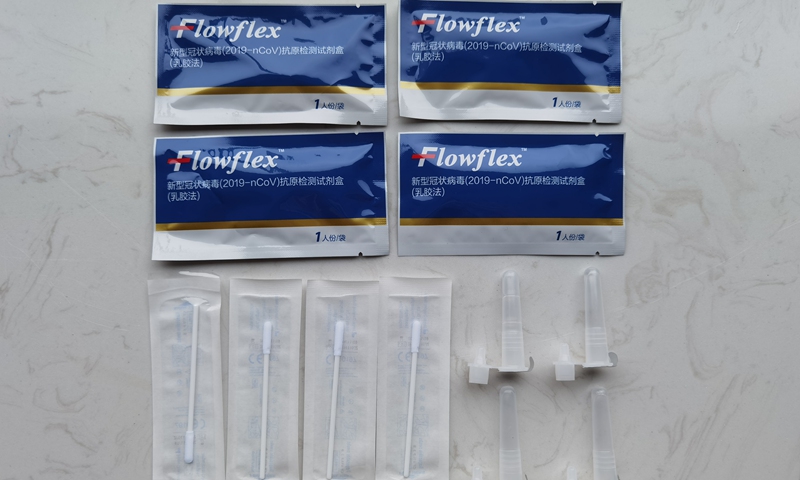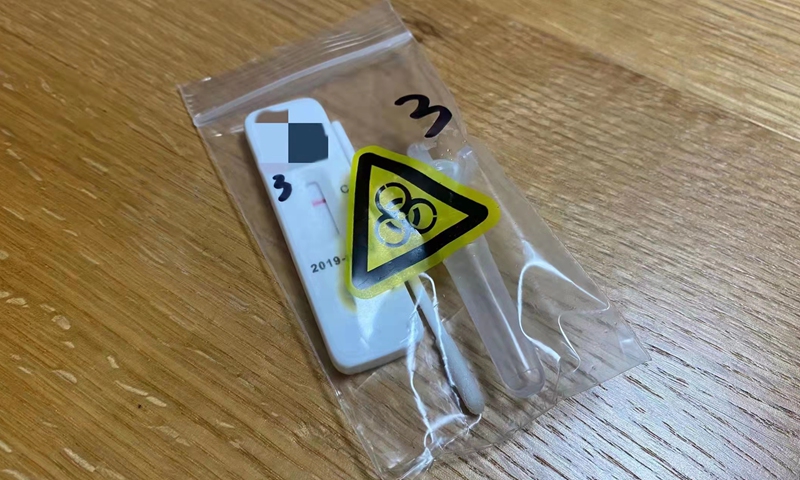
Photo:CFP
Shanghai can't be locked down as it's not only the city of local residents but also an important player in China's and the world's economy, local authority said on Saturday, and the metropolis has decided to try out the combination of nucleic acid testing and antigen self-testing as a new way of COVID-19 prevention and control. The local authority also required to get rid of non-necessary control for emergency medical services following the death of a nurse who died of asthma.
The city reported 38 confirmed cases and 2,231 asymptomatic cases on Friday, the local health authority said at a Saturday press conference, as the city has been facing a tough fight against the Omicron variant.
Wu Fan, an expert from the city's anti-epidemic leading expert team, told the press briefing that Shanghai is currently exploring another way rather than a citywide lockdown by combining the nucleic acid tests and antigen self-testing within key areas and non-key areas. This exploration is decided by the characteristics of the variant as well as of the city, the expert said.
"Why can't Shanghai be locked down? because it's not only the city of local residents, but also the city with a highly important role in China's economy and social development, which has the impact on the global economy," Wu said.
For example, if the city stops operating, there would be many international cargo ships on the East Sea, affecting the country's and the world's economy, she noted.
The new method is carried out by the efficient community grid management in Shanghai, for example, all the areas are divided into key and non-key areas. If a positive case is found in a key area, residential compounds in the area need to go through mass nucleic acid testing one after the other. In non-key areas, the method is the combination of nucleic acid testing and antigen self-testing, as the latter provides the results very fast, which helps to adjust the local management in a more dynamic way, according to the press briefing.
"The key point is to ensure that everyone is covered," Wu said, noting that people can still go out under the condition that everyone going out has a negative test result.

COVID-19 antigen test-kits Photo: Courtesy of the interviewee
Shanghai has launched a round of antigen self-testing starting Saturday across some communities, and local authorities also issued instructions to guide residents how to complete antigen self-testing safely and effectively. Before obtaining results, residents and co-inhabitants are required to remain at home.
Many Shanghai residents have posted their test kit negative results on WeChat Moment on Saturday to share with their friends, which sparked heated discussion. Some netizens made jokes that Shanghai residents had achieved a "Guinness World Records" for nose swabbing on Saturday.
Health workers in our residential communities distributed the antigen home-testing kits door-by-door, a 41-year-old Shanghai resident surnamed Jiang told the Global Times on Saturday.
They notified us how to use it, emphasizing that if the results are negative, the kits can be thrown away as garbage as usual, however, if they are positive, we need to report to the communities immediately and treated the samples as medical waste, Jiang said.
"They also give us a special plastic bag to dispose of the test kits after testing," Jiang noted.
"The process is convenient. I put the sampling swab into my nose and turn it aound in my nostril five times, lasting around 15 seconds, and change another nose to do the same," a 40-year-old Shanghai resident surnamed Wei told the Global Times. "It takes only a few minutes and what you need to do is to follow the steps to wait for the results."
A 36-year-old Shanghai resident living in Xuhui district surnamed Wang told the Global Times that health workers in his community also collected their testing results door-by-door to ensure each resident was tested.

A COVID-19 antigen test-kit indicates a negative result on Saturday in Shanghai; the used kit is placed into a special plastic bag. Photo: Courtesy of the interviewee
In another community in Xuhui district, a 46-year-old Shanghai resident surnamed Fu pointed out that her community didn't receive the kits door-by-door and there are some loopholes in community-level regions which still need to be fixed.
Mahmoud Soliman, an Egyptian national teaching Arabic at Shanghai International Studies University, told the Global Times on Saturday that antigen self-testing is "quick and safe."
"I'm still optimistic about the epidemic in Shanghai," Soliman said, noting that he is good at Chinese, so it's convenient for him to follow instructions written in Putonghua. "Hoping the epidemic will be over soon in Shanghai and all over the world."
The press briefing was held after Shanghai health authority on Friday expressed their deepest condolences after a nurse died of asthma Wednesday night. Wu Jinglei, director of Shanghai's Health Commission, told the briefing on Saturday that all medical institutions should adopt scientific, standard and reasonable anti-epidemic measures.
Services including emergency, fever clinics, surgery, ICU and treatment for pregnant women should follow the principles of "no closure and no control unless necessary" and establish buffering zones and backup plans to enhance the medical services for residents under the anti-epidemic management, Wu Jinglei said.
Shanghai resident Zhou Shengni, who had an asthma attack at home on Wednesday, died after delayed treatment. At 7 pm Wednesday, Zhou's family members took Zhou to Shanghai East Hospital, where Zhou worked as a nurse, for medical treatment, but Zhou was unable to enter the hospital as the emergency department of the south division of the hospital was temporarily closed due to epidemic prevention and control measures, according to a notice released by the hospital on Friday. The hospital was undergoing environmental sampling and disinfection at that time.
Zhou's family members sent her to another hospital kilometers away, where she died hours later.
Medical institutions should also set up "green channels," strictly implement a responsible system for first diagnosis and the rescue system for critically ill patients, and ensure that critically ill patients receive timely treatment, Wu Jinglei said.
Global Times






